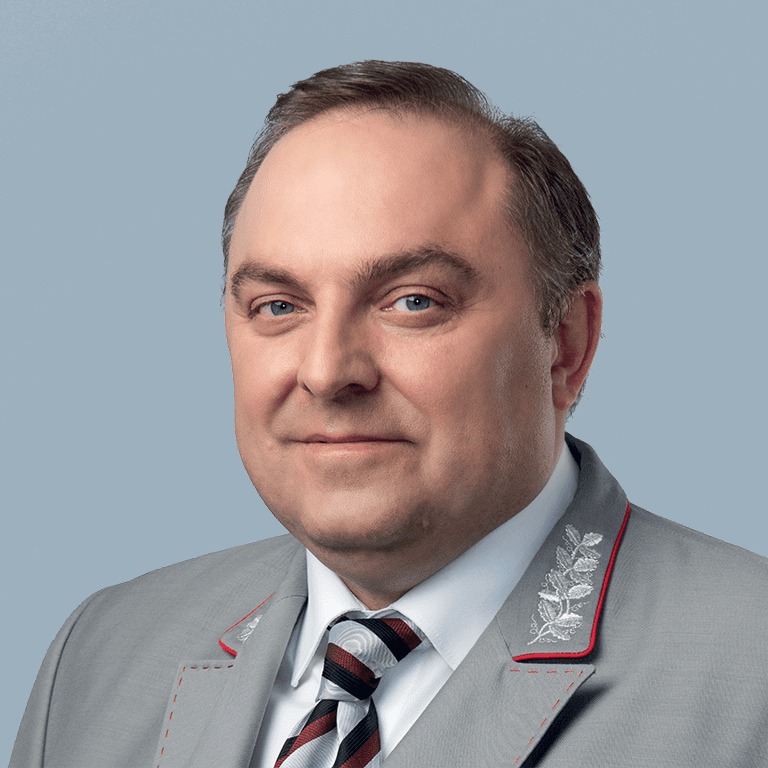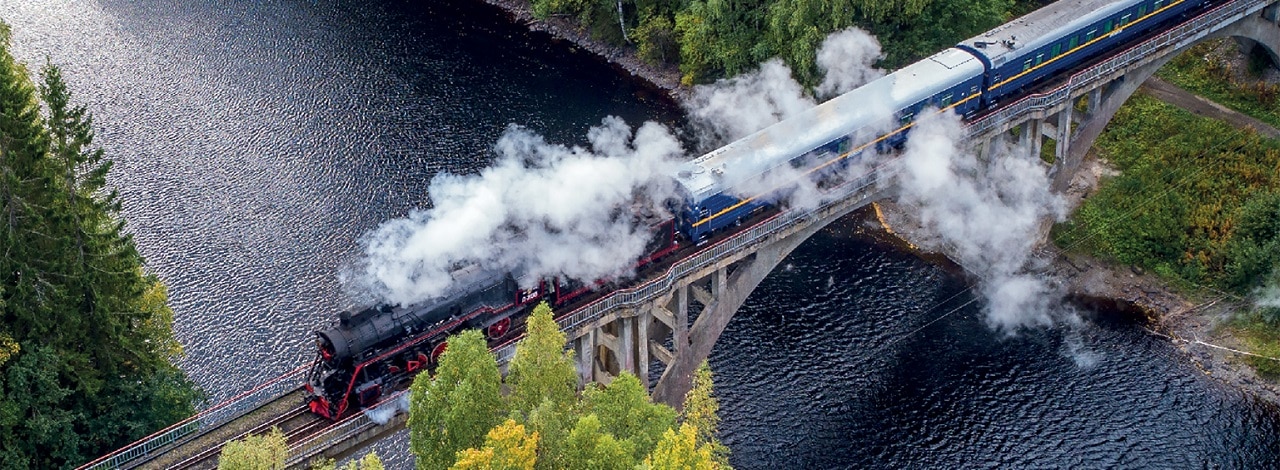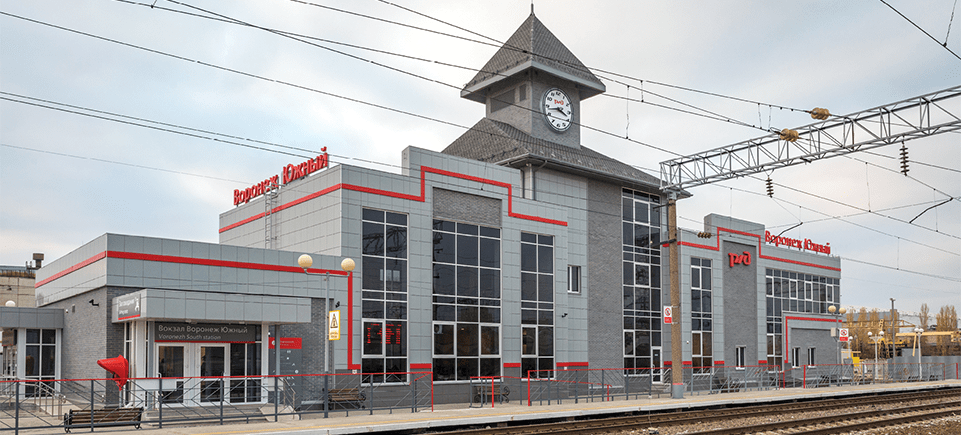Passenger transportation

 We consistently focus on improving transport availability and increasing mobility of people. In passenger transportation, our priorities are convenient railway stations, trains, ticket offices and online capabilities coupled with the top-notch quality of service.”Dmitry Pegov Deputy CEO of Russian Railways
We consistently focus on improving transport availability and increasing mobility of people. In passenger transportation, our priorities are convenient railway stations, trains, ticket offices and online capabilities coupled with the top-notch quality of service.”Dmitry Pegov Deputy CEO of Russian Railways
The primary objective of Russian Railways is to provide all Russian regions with affordable passenger transportation. Along with suburban transportation comprising multimodal routes, the Company is developing long-haul passenger services, including high-speed and ultra high-speed transportation between metropolitan areas.
Russian Railways carries out long-haul and suburban transportation in 77 and 66 regions of Russia, respectively.
In the long-haul segment, the Company seeks to provide all Russian regions with affordable passenger transportation. It lays a strong emphasis on developing high-speed and ultra high-speed transportation to encourage travel between major metropolitan areas.
In the suburban segment, Russian Railways focuses on developing an affordable high-speed alternative to personal cars and public buses in large metropolitan areas.
- In 2019, the Company transported 1,197.8 m people (up 3.5% y-o-y).
- In November 2019, Moscow Central Diameters covering the routes from Odintsovo to Lobnya (MCD 1) and from Podolsk to Nakhabino (MCD 2) were launched as part of the Moscow Transport Hub.
- The Urban Commuter Train project covered 12 cities.
- During the XXIX Winter Universiade in Krasnoyarsk, the Company used 23 pairs of long-haul trains and 58 daily intracity trains to transport sports delegations and fans.
- 40 suburban trains were used during the WorldSkills international skills competition in Kazan.
- In 2019, for the fourth year running, the Company sponsored a 50% ticket discount for children aged 10 to 17 travelling in open sleeping and sitting cars on long-haul routes between 1 June and 31 August. Over the four years, the discount was provided to 10 m children.
- In August 2019, Russian Railways launched the first train with special seats for passengers with children, travelling between Moscow and Anapa.
- Additional 156 pairs of suburban trains were used to transport the guests of the 2019 MAKS International Aviation and Space Salon.
- The Innovation Centre station was added to the Smolensk route to provide transport accessibility for residents of Skolkovo Technopark.
- The Company celebrated the 75th anniversary of the victory in the Great Patriotic War of 1941–1945 by introducing free tickets for life for the war veterans and disabled servicemen and their accompanying persons.
- Russian Railways started selling non-refundable tickets.
- Online ticket sales were launched for all suburban commuter companies of Russian Railways.
- On 7 June 2019, Russian Railways signed an agreement with Siemens Mobility GmbH and Ural Locomotives for the purchase of Sapsan electric trains, as part of the St Petersburg International Economic Forum. The trains will be delivered and commissioned between September 2022 and July 2023.
Key focus areas of the Long-Term Development Programme
In line with the Long-Term Development Programme, the Company intends to fully maintain the volume of socially significant transportation, including through implementing initiatives in Russia’s Far East.
Key initiatives for the long-haul passenger transportation development:
- building an efficient route network and train schedule;
- developing high-speed rail transportation through operation of Lastochka and Strizh trains as well as trains with double-decker railcars;
- providing customers with high quality product offerings;
- digitalising customer services and business processes;
- offering innovative products in trains;
- improving the customer experience;
- introducing the world’s best practices for the development of multimodal transport.
Key initiatives for the suburban passenger transportation development:
- integrating suburban transport into the urban transport environment of metropolitan areas;
- ensuring long-term mutual obligations of all participants of suburban transit systems under the regional tariff and budgetary policies of the Russian Federation;
- adopting regulatory decisions aimed at securing equal opportunities for the development of suburban passenger transportation vs other transport modes;
- launching multimodal transportation (with the possibility of building an integrated route network for several transport modes) along with the comprehensive development of bus transportation services within the Group;
- defining economic incentives for upgrading rolling stock and infrastructure facilities;
- introducing suburban transportation standards for accessibility, quality and safety of passenger transportation;
- enhancing the Central Transport Hub;
- reducing the interval between passenger trains on certain routes, including the Moscow Central Circle.
Key initiatives for the railway station development:
- creation of multifunctional intermodal and transport interchange hubs integrated with the modern urban environment and infrastructure;
- efficient use of railway station areas (including synergies and cooperation with bus stations).

In 2019, the Company’s passenger transportation volumes reached an eleven-year high of almost 1.2 bn people (up 3.5% y-o-y). The growth both in suburban and long-haul transportation was driven by the launch of new services, rolling stock upgrades and improvements in service speed, quality and accessibility.
In 2019, Russian Railways’ long-haul passenger turnover rose by 3% y-o-y to 99.1 bn pkm, with over 116.5 m passengers transported (up 5.6%
Suburban passenger turnover rose by 3.5% y-o-y to 34.3 bn pkm, with 1,081.3 m passengers transported (up 3.3%
The growth in the number of passengers transported was partly driven by the launch of Moscow Central Diameters and increased use of the Moscow Central Circle.
Rolling stock renewal
In 2019, the Company purchased 572 new passenger cars, including 257 innovative passenger cars (up 3.9x y-o-y), 154 out of which were double-deckers (up 2.
The latter are fitted for people with reduced mobility, passengers with children, bicycles and strollers.
In 2019, the Company also purchased 50 novel open cars (model of 2019) with improved facilities. All seats on these trains are equipped with curtain holders to give passengers more privacy.
We also purchased 158 cars arranged in 19 trains for suburban transportation. The suburban rolling stock renewal helped to satisfy the demand for this kind of transportation in the Russian regions.
On the sidelines of the St Petersburg International Economic Forum in June 2019, Russian Railways signed an agreement with Siemens Mobility GmbH and Ural Locomotives for the purchase of additional Sapsan electric trains. Thirteen newly manufactured ten-car single-voltage Sapsan trains will be travelling between Moscow and St Petersburg. Their delivery and commissioning will start in September 2022.
| Indicator | 2015 | 2016 | 2017 | 2018 | 2019 | Change y-o-y, % |
|---|---|---|---|---|---|---|
| Passenger turnover, bn pkm | 120.4 | 124.5 | 122.9 | 129.4 | 133.4 | 3.1 |
| Suburban transportation | 30.9 | 31.0 | 31.9 | 33.1 | 34.3 | 3.5 |
| Long-haul transportation | 89.5 | 93.5 | 91.0 | 96.3 | 99.1 | 3.0 |
| including high-speed and ultra high-speed trains | 3.7 | 4.6 | 6.1 | 7.3 | 7.9 | 8.0 |
| Passengers transported, m people | 1,020.4 | 1,037.0 | 1,117.9 | 1,157.2 | 1,197.8 | 3.5 |
| Suburban transportation | 922.5 | 935.6 | 1,015.7 | 1,046.9 | 1,081.3 | 3.3 |
| Long-haul transportation | 97.9 | 101.4 | 102.2 | 110.3 | 116.5 | 5.6 |
| including high-speed and ultra high-speed trains | 7.7 | 9.2 | 12.4 | 15.6 | 17.1 | 9.9 |

Suburban transportation services are provided by 25 suburban passenger companies (SPCs), with Russian Railways, regional executive authorities, private investors and Aeroexpress among the co-founders. Russian Railways holds more than 50%.
The government support of suburban transportation, by way of reimbursed infrastructure costs and a discount factor of 0.01, makes it possible to set the price of tickets at a socially affordable level. In 2019, most regions opted not to increase rail fares.
Development of suburban transportation
The Moscow Central Circle and Moscow Central Diameters are a perfect example of how effectively suburban railways can be integrated into the urban environment. The resulting increase in carrying capacity, load lifted off the existing public transport system, convenient transfers, unified ticketing system and navigation across the Moscow Transport Hub speak for the development of similar projects in other parts of the country.
The Urban Commuter Train, a rapidly growing regional project, received positive response from passengers. The project encompassed 12 metropolitan areas: Moscow, Krasnoyarsk, Ufa, Rostov-on-Don, Tambov, Voronezh, Volgograd, Kaliningrad, Kazan, Tyumen, Vladivostok and Nizhny Novgorod.
In March 2019, the Urban Commuter Train in Krasnoyarsk made a significant contribution to the transport accessibility of sports facilities during the Universiade. The trains served more than 20,000 residents and guests.
On 1 June 2019, the Urban Commuter Train was launched in Vladivostok.
Progress on multimodal routes and hubs in 2019
The most successful approach to the integration of urban passenger systems is the creation of transport interchange hubs, where the passengers can switch between railway and other types of urban and suburban transport. The new hubs are accessible to people with reduced mobility and meet all modern requirements.
In 2019, seven suburban passenger companies launched 14 new multimodal routes. There are currently 120 multimodal suburban routes provided by 14 companies.

In 2019, MCC transported 147.5 m passengers, up 13.8% y-o-y. The daily average exceeded 405,000 people, with a record high of over 580,000 passengers achieved on 25 December. In 2019, the growing popularity of MCC required an increase in the throughput and carrying capacities. The intervals were reduced to four minutes at peak hours and eight minutes at other times (initially, the trains arrived every six minutes during peak hours and every twelve minutes during off-peak hours on week days, and on the weekends these intervals stood at eight and 15 minutes, respectively). This is expected to increase the estimated daily capacity of trains by 36% on week days and by 40% on weekends and holidays.

Long-haul passenger turnover stood at 99.1 bn pkm, up 3% y-o-y. Passenger traffic increased by 5.6% to 116.5 m.
Long-haul transportation services are provided by six carriers: Federal Passenger Company, Grand Service Express TC, Tverskoy Express, TransClassService, Sakhalin Passenger Company, and High-Speed Transportation Directorate (branch of Russian Railways).
In 2019, the share of Russian Railways’ subsidiaries and affiliates in the long-haul passenger traffic decreased to 93.8% (down 0.8 pp). Private carriers increased their market share to 1.6% (up 0.2 pp). Russian Railways’ share in the total passenger turnover also grew to 4.6% (up 0.6 pp).

Federal Passenger Company’s performance
Federal Passenger Company is Russian Railways’ subsidiary, which provides long-haul passenger and freight luggage transportation services.
In 2019, Federal Passenger Company’s passenger turnover totalled 93.6 bn pkm (up 2.2% y-o-y). The Company transported some 105.8 m people. For the trains made up by Federal Passenger Company, passenger turnover along the route was 90 bn pkm (up 2.5%
In 2019, Federal Passenger Company’s income from core operations amounted to RUB 236.9 bn (up 4.8% vs 2018), including RUB 213.4 bn of income from passenger transportation (up 5.5%). The net profit totalled RUB 6.6 bn (+9%).
International transportation
In 2019, besides the CIS and the Baltics, Federal Passenger Company served direct and transit routes to eleven countries of Europe and Asia – Germany, France, Poland, Austria, the Czech Republic, Monaco, Italy, Finland, China, Mongolia, and North Korea.
In 2019, 6.55 m passengers were transported in the international segment, down 3.2%
Non-CIS segment showed a rising number of passengers travelling to and from Finland. In 2019, Allegro trains transported 557,200 passengers between St Petersburg and Helsinki (both ways), up 15.7% y-o-y. Higher passenger volumes were also recorded on routes to Mongolia, Germany, and Italy.
High-speed passenger transportation
High-speed transportation services are provided by Federal Passenger Company and High-Speed Transportation Directorate (a branch of Russian Railways). The latter serves Moscow–St Petersburg, Nizhny Novgorod–Moscow–St Petersburg, St Petersburg–Bologoye, Moscow–Ivanovo, and other routes.
In 2019, high-speed and ultra high-speed passenger turnover totalled 7.9 bn pkm (up 8% y-o-y). The number of passengers transported stood at 17.1 m (up 9.9%), including 5.69 m passengers transported by Sapsan (up 4%).
Read more about Federal Passenger Company at

In 2018, the Company adopted the Long-term Development Programme for its railway stations until 2025. In 2019, the Company upgraded six stations (Krasnoyarsk, Abakan, Mogocha, Nizhny Novgorod, Volgograd, Ulan-Ude) and nine platforms (main platform in Tambov, main platform in Krasnoyarsk, No. 1 in Krasnoyarsk, No. 2 in Krasnoyarsk, No. 1 in Saratov, No. 1 in Ivanovo, No. 1 in Petrozavodsk, No. 5 at the Finland Station, and No. 1 in Abakan).
At Belorussky railway station, a passenger terminal was built to decrease intervals in the cyclic timetable between suburban commuter trains on the Moscow–Odintsovo route. At the Leningradsky station in Moscow and the Moskovsky station in St Petersburg, passengers can enjoy new refurbished business lounges.
In 2019, 71 stations were equipped with additional security screening and other equipment to improve safety.
Accessibility for people with reduced mobility
Russian Railways focuses on helping people with reduced mobility and making a growing number of stations fully accessible. As at the end of 2019, 48 stations were adapted. By 2025, the Company plans to increase their number to 137.
In 2019, Russian Railways modified the Krasnoyarsk station to suit people with reduced mobility ahead of the XXIX World Winter Universiade. The station was fitted with accessible ticket offices, new retiring rooms, lifts, and wheelchair ramps.
The Company is also expanding its Mobility Assistance Centre, covering over 900 stations and transport stops (up 67%
Russian Railways aims to offer its customers a new level of service quality in a timely manner. Passenger feedback contributes to its continuous improvement.
Russian Railways Unified Information Service Centre provides information on the Company’s passenger services.
In 2019, the Centre handled 10.6 m queries (up 2.1% vs 2018).
The quality of passenger services provided by the Russian Railways Group is measured by the customer satisfaction index (CSI).
In 2019, the Company conducted four internal surveys – in January, April, July and November.
Key service innovations implemented in 2019
- Non-refundable tickets. Since April 2019, customers can opt for a non-refundable fare instead of a regular one to save 5–20% of the ticket price.
- Increase in the advance booking horizon for certain domestic long-haul routes to 120 days.
- Wider use of dynamic tariff management and demand stimulation for international trains.
- Sale of Electronic Business Pass for the Red Arrow trains (Moscow–St Petersburg–Moscow).
- Reduced fares for the veterans and disabled servicemen of the Great Patriotic War and their accompanying persons (from 1 May to 31 December 2019).
- Whole Family Travel: 20% discount for multi-child families on domestic routes (from 1 June to 31 July 2019).
- Food delivery from city restaurants to the train car (available in Moscow; in 2020, the service is planned to be rolled out to St Petersburg, Yaroslavl, Rostov-on-Don, Chita, Novosibirsk and Samara).
- Electronic tickets: buying and reissuing. In 2019, the share of e-tickets for Federal Passenger Company’s long-haul trains amounted to 57.4%.
- Pilot sales of all-in-one tickets valid on various types of public transport (rail and road) within the Kursk Region.
- Pilot e-ticket sales for corporate clients through the Russian Railways website using the unified billing account.
- Purchase of new rolling stock.
- New routes for double-decker railcars and high-speed Lastochka trains.
- Availability of all sections of the Sapsan’s infotainment system in English and Chinese.
- New children’s section of the Sapsan’s infotainment system.
- Electronic feedback form for Sapsan passenger requests.
- Upgrade and reconstruction of railway stations and passenger platforms.
- Development of suburban multimodal transportation routes (train & bus).
- New Wi-Fi hotspots and multimedia portals.
- Thematic children’s cars.
- Free suburban train travels for veterans and their accompanying person in May 2019.
- New excursions and tourist routes, including on steam-powered retro trains.
